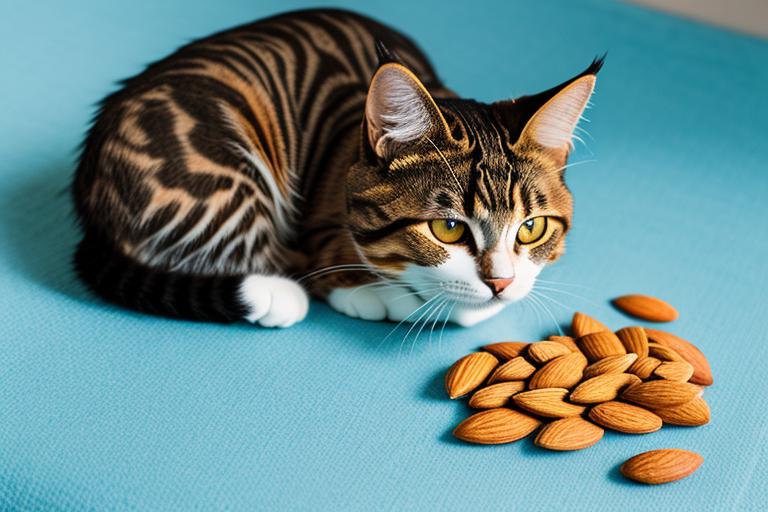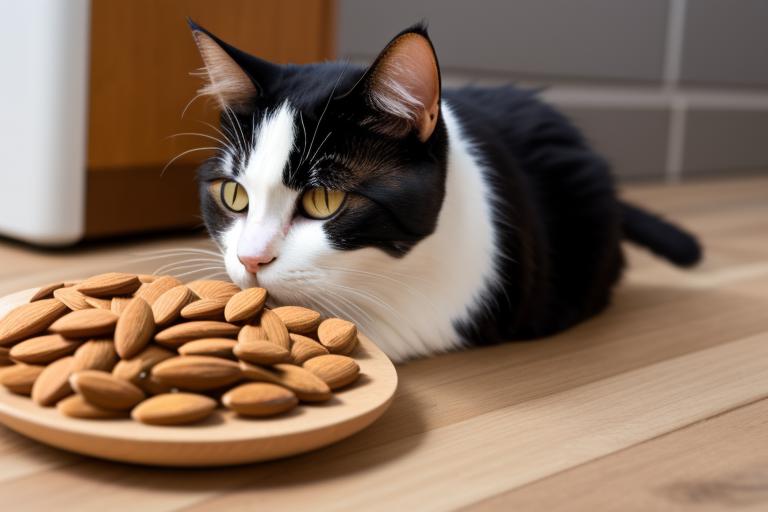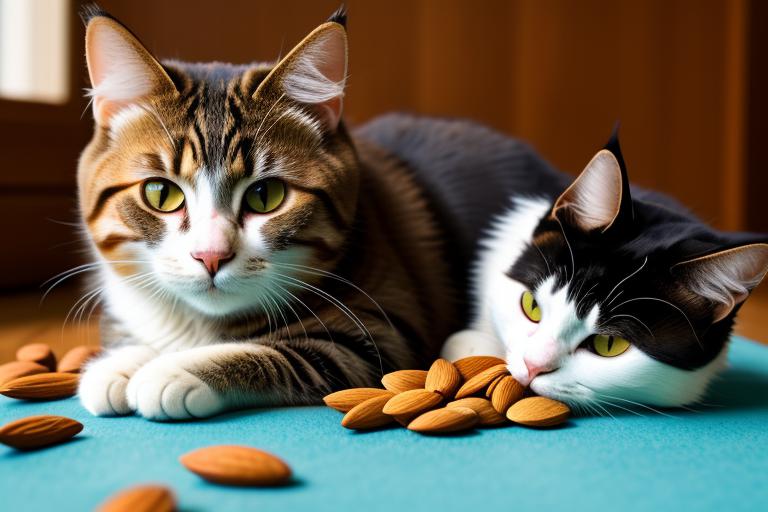Are you wondering if your beloved feline friend can munch on almonds? While almonds may seem like a healthy snack for humans, it’s important to consider whether they are safe for cats. As a responsible pet owner, you want to ensure that your furry companion’s diet is suitable for their specific needs.
So, let’s explore the potential risks and benefits of feeding almonds to cats, as well as some alternative snack options. But before we dive into it, there’s an important factor you need to be aware of that might surprise you.
Almonds: Are They Safe for Cats?
While almonds are generally safe for humans, they can pose some risks to cats. Cats have different digestive systems than humans, and some foods that are safe for us can be harmful to them. Almonds, in particular, can be difficult for cats to digest due to their high fat content. Consuming too many almonds can lead to gastrointestinal issues, such as stomach upset, diarrhea, or even pancreatitis in severe cases.
Another concern with almonds is their size and shape. Almonds are small and hard, making them a choking hazard for cats. If a cat tries to swallow a whole almond without properly chewing it, it can get stuck in their throat or cause an obstruction in their digestive tract. This can be a life-threatening situation that may require immediate veterinary intervention.
Additionally, almonds can be coated with various seasonings or flavorings, such as salt or chocolate, which are toxic to cats. These additives can lead to salt poisoning or chocolate toxicity, both of which can have serious consequences for your feline friend.
Potential Risks of Feeding Almonds to Cats

Feeding almonds to your cat can pose potential risks due to their high fat content and the potential for choking hazards. While almonds might seem like a healthy snack for you, they aren’t suitable for feline consumption. Here are some reasons why you should avoid feeding almonds to your cat:
- Choking Hazards: Almonds are small and hard, making them a choking hazard for cats. If your cat accidentally swallows a whole almond or a piece of it, it could get lodged in their throat, leading to a life-threatening situation.
- High Fat Content: Almonds are high in fat, which can be harmful to cats. Consuming too much fat can lead to weight gain, digestive issues, and even pancreatitis, a serious condition that affects the pancreas.
- Digestive Upset: Cats have a delicate digestive system, and almonds can be difficult for them to digest. This can result in stomach discomfort, vomiting, and diarrhea.
- Allergic Reactions: Cats can be allergic to almonds, just like humans. Symptoms of an allergic reaction may include itching, swelling, difficulty breathing, or even anaphylaxis. It’s important to note that allergic reactions can be life-threatening and require immediate veterinary attention.
To keep your feline friend safe and healthy, it’s best to stick to a balanced diet specifically formulated for cats.
Health Benefits of Almonds for Cats
While almonds may be a tasty and nutritious snack for humans, they don’t provide any health benefits for cats. Cats have specific dietary needs that are different from humans, and almonds don’t meet these requirements. Cats are obligate carnivores, meaning their bodies are designed to thrive on a diet that consists primarily of meat. They need certain nutrients, such as taurine, that are found in animal tissues and are essential for their overall health. Almonds, on the other hand, are a plant-based food and don’t contain taurine or other essential nutrients that cats need.
Feeding almonds to cats can also pose a risk of choking or gastrointestinal blockage. Almonds are small and hard, making them difficult for cats to chew and digest properly. If a cat swallows a whole almond or a large piece of almond, it can get stuck in their throat or intestines, leading to serious health issues that may require surgical intervention.
Instead of giving your cat almonds, it’s best to stick to a balanced and species-appropriate diet that’s specifically formulated for their nutritional needs. This will ensure that your cat receives all the essential nutrients they need to thrive and maintain good health.
Alternatives to Almonds for Cat Snacks
If you’re looking for cat-friendly alternatives to almonds as snacks, there are several options available. While almonds aren’t toxic to cats, they can be difficult for them to digest and may pose a choking hazard. To keep your feline friend safe and satisfied, consider these alternatives:
- Cooked chicken: Cats are carnivores, so lean, cooked chicken can be a tasty and healthy snack for them. Just make sure to remove any bones and seasonings before feeding it to your cat.
- Pumpkin puree: Rich in fiber and low in calories, pumpkin puree is a great alternative to almonds. It can aid in digestion and even help with hairballs. Be sure to use plain, canned pumpkin puree without any added sugar or spices.
- Blueberries: These tiny fruits are packed with antioxidants and can be a refreshing treat for your cat. Just remember to wash them thoroughly and remove any stems before serving.
- Salmon: Rich in omega-3 fatty acids, salmon isn’t only a delicious snack for cats, but it also promotes a healthy coat and supports brain function. Make sure the salmon is cooked and boneless before offering it to your feline companion.
Best Practices for Introducing Almonds to Cats

To ensure the safe introduction of almonds to your cat’s diet, it’s important to establish proper guidelines and precautions. While almonds are generally safe for humans, they can pose certain risks to cats if not introduced correctly. Here are some best practices to follow when introducing almonds to your feline friend.
First and foremost, it’s crucial to consult with your veterinarian before introducing any new food to your cat’s diet. They can provide valuable advice and guidance based on your cat’s specific needs and health conditions.
When offering almonds to your cat, it’s recommended to start with small quantities. This allows you to monitor your cat’s response and ensure they don’t have any adverse reactions. It’s also important to ensure that the almonds are unsalted, unflavored, and free from any additives or seasonings that could be harmful to cats.
Furthermore, it’s crucial to observe your cat after consuming almonds for any signs of discomfort or digestive issues. If you notice any symptoms such as vomiting, diarrhea, or difficulty breathing, it’s essential to seek immediate veterinary attention.
Lastly, it’s worth noting that while almonds can be a source of healthy fats and protein for humans, they aren’t a necessary part of a cat’s diet. Cats are obligate carnivores, meaning their bodies are designed to thrive on a meat-based diet. Therefore, almonds should only be given as an occasional treat and shouldn’t replace their regular cat food.
Frequently Asked Questions
Cats should not eat other types of nuts besides almonds. Nuts can be difficult for cats to digest and may cause gastrointestinal upset. Stick to cat-friendly treats to keep your furry friend healthy.
To prepare almonds for your cat, make sure to remove the shells and any seasoning. Chop them into small, bite-sized pieces. However, it’s best to avoid feeding almonds to cats as they can be a choking hazard and cause digestive issues.
Feeding almonds to cats can worsen specific health conditions. It’s important to be aware of any existing health issues your cat may have before giving them almonds as it could have negative effects.
Cats can develop allergies to almonds. It’s important to remember that not all human foods are safe for cats. If you notice any signs of an allergic reaction, consult your veterinarian.
There are no age restrictions for feeding almonds to cats. However, it’s important to note that almonds are not recommended for cats due to the potential risks they pose to their digestive system.
Conclusion
In conclusion, it’s best to avoid feeding almonds to cats. While almonds aren’t toxic to cats, they can be difficult for them to digest and may cause digestive issues or even choking hazards.
There are plenty of cat-friendly snacks available that provide similar health benefits without the potential risks.
It’s always important to prioritize your cat’s well-being and consult with a veterinarian before introducing any new foods into their diet.

